John Ford was one of the many luminaries of the western genre. With one of his final western films, The Man Who Shot Liberty Valance is truly one of the most elegant westerns in cinematic history. The two principal actors featured here are enough to guarantee unfathomable success.
Set in the Wild West, James Stewart plays a United States senator named Ransom Stoddard who travels to the town of Shinbone to pay respects to one of his old friends. Newspaper reporters begin speculating about the senator's business in such an insignificant western town. Ransom concedes to the press and decides to share his story. Subsequently the film is a series of extravagant flashbacks that shed light on Ransom's close friendship with a cowboy named Tom Doniphon (Wayne). His friendship begins after Ransom is beaten badly and robbed by a group of outlaws lead by the renowned Liberty Valance (Marvin). Vowing revenge, Ransom utilises his skills as a lawyer in an attempt to clean up the west without using violence. He teaches those in need how to read and write. His use of literature and words makes him a respected member of the community. However he realises that the west is not controlled by law and order but by murder and violence. Cowboys and gunslingers take the law into their own hands as they decide who lives and who dies. Ransom's story then uncovers how his political career became so successful after he became known as "the man who shot Liberty Valance".
A quality western is only guaranteed if there is a stellar plot. In this case, The Man Who Shot Liberty Valance has what could be the best plot for a western I have ever seen. The 50s and 60s were certainly the decades dominated by loads of successful westerns. It's impossible to forget westerns helmed by Sergio Leone, or westerns that starred such stars as Clint Eastwood, Gary Cooper or John Wayne. These three men were the essential embodiment of a western protagonist.
With this film, John Wayne plays a fairly original role. Wayne still has the baggy trousers, the trademark walk, the recognisable facial expressions and the fast gun-touting skills. Despite this pile of conventions his character is explored to be a man of more moral depth. His portrayal is engaging and engrossing. I found it easy to get into the movie due to his dynamic performance. Because John Wayne was so famous during the period of the film's release this is an offer too tempting to resist. On top of this we have a straight-forward, intriguing plot and one of the world's all-time greatest actors: James Stewart. When this film was made it was clear that Stewart was aging. This doesn't stop him from delivering one of his most memorable roles to date. He still has his charm and charisma now mixed with bravery and honour. It's very easy to empathise with his character.
The Man Who Shot Liberty Valance of course has the usual conventional bad guys: they are dirty, have bad teeth and look very unsavoury. Although a contemporary audience would usually find this far too stereotypical you must remember that this was made during the period of the westerns. It was tradition to have these characters included.
The film is topped off admirably with smart direction and an exciting score. John Ford will always deliver when it comes to the western genre. Each director made their own mark on the genre. Each director has a different way of staging the action, placing the camera and building up intensity. Ford is a natural when it comes to this style of movie.
The Man Who Shot Liberty Valance was pasted and criticised upon original release. Decades later and the film is now considered as a classic and one of cinema's greatest westerns. It depends on your taste in film whether you will enjoy this one or not. Especially if you like westerns, this is a film you cannot afford to miss.
Extravagent western!
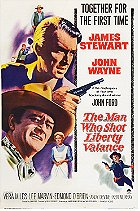 Posted : 17 years, 1 month ago on 11 May 2008 12:54
(A review of The Man Who Shot Liberty Valance)
Posted : 17 years, 1 month ago on 11 May 2008 12:54
(A review of The Man Who Shot Liberty Valance) 0 comments, Reply to this entry
0 comments, Reply to this entry
Mediocre propoganda.
 Posted : 17 years, 1 month ago on 10 May 2008 09:58
(A review of Lions for Lambs)
Posted : 17 years, 1 month ago on 10 May 2008 09:58
(A review of Lions for Lambs)
Lions for Lambs marks the first feature from the now Tom Cruise owned company of United Artists. Despite its poor box office profit and heavy pasting, I found the movie to actually be quite decent.
The film is three different stories told in parts throughout the movie. The main story is concerned with action in Afghanistan by U.S. soldiers. Two soldiers end up wounded and vulnerable on the top of a snowy mountain. Low on ammo and low on energy, their superiors back at base do what they can to launch a rescue mission. The next story is about a journalist (Streep) who visits a congressman (Cruise) to interview him for a story. The final tale is about a young student (Garfield) who arrives one morning in the office of a university professor (Redford) to discuss his future among other things.
The film is straight-up dialogue, talking and exposition. Those expecting anything action-orientated will be disappointed. The lack of action was the biggest problem. I know it was meant to make a political statement and not be an entertainment piece, but it's rather impossible to do so towards the audience by just using scenes of dialogue. The performances were good and the script was intelligent, but the whole thing feels so boring. Black Hawk Down, for example, made an exceptional statement with scene of action and dialogue.
The lack of an actual meaty story is another problem. There are 3 stories to tell, but without an actual solid plot to drive these tales it feels very hollow and empty. Instead it relies on the audience's knowledge of the war on terror as a basis for the plot. So what will happen in 20 years when it's revisited long after the war on terror is over? Some who approach it may think of it as an entertainment piece, but they will be clueless about which war it is meant to be symbolising. Such other political war films like Black Hawk Down give the viewer insight into what has happened and what is planned, rather than diving straight into the action. Still, I liked the performance and the precious little action was kind of satisfying (although the special effects looked a bit dodgy).
Tom Cruise's performance wasn't too bad. As a congressman, he does okay. But he just appears to be Ethan Hunt behind a desk discussing political issues. Meryl Streep was one of the stronger actresses in the film. She makes a very stern journalist. As for Robert Redford (who also directed), well I think he did a pretty good job.
It's a shame that Lions for Lambs didn't turn out as good as some other dialogue driven war films like Ed Zwick's Courage Under Fire. Instead we're fed a bunch of biased American propaganda that attempts to be more than it actually is.
It's not powerful enough to make a worthwhile political statement, and it's not enjoyable enough to be considered an entertainment piece. I don't really know how to describe it, really. Worth seeing, but one of 2007's biggest disappointments.
 0 comments, Reply to this entry
0 comments, Reply to this entry
Sizzling Scorsese crime drama.
 Posted : 17 years, 1 month ago on 10 May 2008 07:29
(A review of The Departed)
Posted : 17 years, 1 month ago on 10 May 2008 07:29
(A review of The Departed)
Most people were very sceptical about Scorsese approaching a remake of a highly successful original Asian movie. Personally I really liked the original Asian film Infernal Affairs and was hoping Scorsese could once again pull off his magic.
The Departed is an infinitely better movie than its Asian counter-part in my opinion. I found myself completely engaged in this movie from start to finish. The Departed has all the same key plot points as the Hong Kong picture that spawned it.
For this film Scorsese is not focusing on the usual Italian American gangsters; instead the film is set in Boston where the Irish gangsters dominate the mob and the police. Leonardo DiCaprio plays Billy Costigan; a man on the wrong side of the tracks who has mobster blood in him. Billy graduates from the Massachusetts State Police Academy with plans to bury his mob heritage. But those higher up in the police force have other plans. Because of Billy's background he's the perfect man to infiltrate the Irish mob. Billy is assigned to work undercover (extremely confidentially) and penetrate a group of Irish gangsters lead by infamous Irish mobster Frank Costello (Nicholson). Billy's mission: to acquire enough evidence to have Frank Costello arrested.
Unbeknownst to the police, Frank Costello's protégée Colin Sullivan (Damon) is another young cadet who graduates from the police academy with excellent results. Because Colin reaches a position of such power and importance he is the perfect man to be Frank's mole inside the police. New clues lead to some unfortunate discoveries and both sides soon realise that they're being scrutinised by the enemy. Of course both sides do not desire this close scrutiny; each respective side assigning their mole to discover the identity of the other mole.
One of the main elements of The Departed that made it far superior to Infernal Affairs is that Scorsese takes his time to develop the characters. Infernal Affairs moved so fast and contained cryptic dialogue, hence I had no idea what was actually going on. The characters in that film were also poorly distinguished. With this film, we take a deeply penetrating look at the life of each character. Scorsese is never in a rush to get anywhere. If anything this slow pace made the film a lot more fascinating.
The Departed is an incredible crime thriller that also contains some truly breathtaking performances. Leonardo DiCaprio was an actor I had little respect for. Prior to 2006 he was too much of a pretty boy who gets the girl. With this film and Blood Diamond in the same year, DiCaprio produces his best two performances to date. At the Golden Globes he was nominated twice for Best Actor; one for each respective film. What makes DiCaprio so excellent is his deep and confronting portrayal. Billy Costigan is a profoundly insightful, multi-faceted character. At first he displays professionalism. But when he is put undercover he has become the bad boy. I never expect him to pull off such a stunning portrayal after all his 'pretty boy' roles. Matt Damon is every bit as brilliant as DiCaprio. He shows a wide range of emotions and he never strikes a false note. Jack Nicholson is truly electrifying! He plays Costello with an intimidating screen presence. Like each amazing performance, there is believability and vulnerability expressed throughout the film.
The film's screenplay is fantastic. Heavy drama is balanced out with a high level of violence and bloodshed. When Scorsese wants a character's death to be violent he doesn't hesitate to add endless amounts of blood into a shot. After decades of moviemaking and decades of making the best quality crime films around, Martin Scorsese finally scored an Oscar at the Academy Awards for his extraordinary directing. The film clocks at approximately 140 minutes; however director Scorsese maintains focus and concentration for every frame that appears in the film. It's impossible to fault the filmmaking in any way.
I particularly liked how classy its style is. There's catchy music played frequently, compelling drama and violent action. You know this is definitely a film by Martin Scorsese.
The Departed could be Scorsese's best film. Personally I loved his movies like Taxi Driver, GoodFellas and Casino. Like the films he made beforehand, Scorsese does not disappoint. He continues to remind us why he is the guru of the crime thriller genre. The only drawback on The Departed would be its shocking and depressing conclusion. Although because of the film's nature and style it was almost to be expected.
Overall, this is a thriller you simply cannot afford to miss. Winner of several Academy Awards including Best Picture and Best Director.
 0 comments, Reply to this entry
0 comments, Reply to this entry
Breathtaking drama.
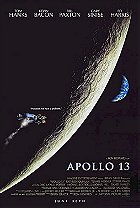 Posted : 17 years, 1 month ago on 9 May 2008 01:23
(A review of Apollo 13)
Posted : 17 years, 1 month ago on 9 May 2008 01:23
(A review of Apollo 13)
The sci-fi genre has resulted in the release of several absurd space films. You can forget about Hollywood blockbusters like Armageddon, Pitch Black, Deep Impact, Lost in Space, Mission to Mars and several others. Not since Stanley Kubrick's 2001: A Space Odyssey has there been a real space movie that captures the wonder of space; that captures how mesmerising and stimulating the experience would be. My prayers were finally answered when Ron Howard was given the green light to make this phenomenal film.
In a nutshell: Ron Howard's Apollo 13 is utterly exceptional. Director Howard has been able to meticulously recreate such an extraordinary scientific occurrence in stunning detail that firmly places the viewer inside the spaceship with the men who are in mortal peril.
Apollo 13 is a film that tells a dramatic account of the true danger that three frail humans faced while in outer space when an explosion on board their vessel cast doubt on them ever reaching it back to Earth. When the explosion occurs and the danger becomes real, the scientists back at NASA would not rest until the crew were brought back home safely.
We follow the three protagonists up in space whose lives are challenged, we follow the NASA scientists back on Earth working to bring the crew home, and we follow those on the home front who are worried sick about their loved ones: three different perspectives of the one heart-stopping event.
Ron Howard's direction is just exceptional; because of the skilful directing I actually forgot it was a movie due to its realism and flawless special effects. It's very hard to believe that this film was made when CGI was still in its youth. Of course Howard's direction was also accompanied by a spectacular cast.
The one thing that struck me about Apollo 13 was its striking realism and believability despite an abundance of well-known actors. Tom Hanks emerged as the principal character here. Hanks is one of the world's greatest actors and he is capable of convincingly pulling off any role that falls into his lap. I couldn't think of anyone better suited to this job. His portrayal is both powerful and moving. Needless to say, each and every other cast member did their job to a high standard. Gary Sinise was a particular surprise as one of those present at NASA during the crisis.
I will admit that the film's opening is fairly slow-paced. It demands patience from its audience. Because when the action moves into space it's extremely hard to drag your eyes away from the screen. In space the film is brimming with realism and an engrossing sequence of events.
I thought one of the most significant things that made this movie so brilliant was its spectacular special effects. I have not seen special effects of this high standard since Kubrick's 2001: A Space Odyssey. Everything was scrupulously detailed: the space ship (both interior and exterior), as well as the interior of the NASA building. The exterior of the Apollo 13 is particularly well executed and almost impossible to fault. For a film of the 90's this high level of quality is extremely rare.
Apollo 13 scores higher than any space-oriented Hollywood blockbuster fluff, and firmly positions itself amongst the best movies ever made. This filmmaking is tremendously close to perfection. Just think that it was only about 40 years ago when the world held their breath while watching footage of Apollo 13's perilous situation in space. If this film was not a true story, I couldn't have believed it was possible.
 0 comments, Reply to this entry
0 comments, Reply to this entry
Classic Monty Python.
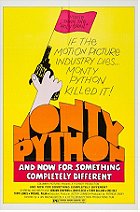 Posted : 17 years, 1 month ago on 9 May 2008 01:10
(A review of And Now for Something Completely Different)
Posted : 17 years, 1 month ago on 9 May 2008 01:10
(A review of And Now for Something Completely Different)
The Monty Python troupe scored much success with their long-running TV series Monty Python's Flying Circus. This introduced the world to a very unique style of British humour, and also gave the Monty Python troupe a big name. This was a positive when it came time to release the first film outing of the Monty Python gang.
And Now For Something Completely Different is essentially a very amusing anthology of famous, memorable (very silly) skits from their former TV show that are given an elaborate reworking. The production values are a whole lot better and the scripts have also been altered. During some of their memorable skits the higher production values equalled improvement over the original TV show version. However some of the more classic Monty Python moments were of higher standard when first broadcast in Flying Circus.
And Now For Something Completely Different has got all the basics...Dead Parrot, Lumberjack Song, Upper Class Twit of the Year, Self Defence Against Fresh Fruit, Marriage Guidance and several others, so you know you're all set. Much of the dynamic skits are of the usual outrageously hilarious Monty Python standard we've come to appreciate over the years; random humour, cerebral humour and slapstick humour. If you like the comedy style utilised by the Pythons you will without doubt have a tremendously fun time. If you're not a fan of the Pythons this is probably one to avoid.
Unless you count the numerous sub-plots that vary between skits, there is absolutely no discernable plot or storyline to speak of. The whole film is an extended episode of the former TV show; funny skits that are stitched together with a few transitional shots that take the random humour even further (for the most part these transitional shots are just random images of people saying "And now for something completely different"). I think it's pretty much impossible to get sick of such great Monty Python skits, and in my opinion it's impossible not to find the Python troupe's amusing antics anything short of hilarious.
I have been a fan of Monty Python for years and I am never disappointed in their unique humour. And Now For Something Completely Different is a fantastic film that supplies a number of great laughs and can make a rainy afternoon go by in no time. This is a reminder of the outstanding work the team were capable of producing when they were in their prime. The first Monty Python film is a top-notch effort on everyone's part. For the Python fans, this is absolutely unmissable. After the success of this film the Pythons were then given the green light to make Monty Python and the Holy Grail.
 0 comments, Reply to this entry
0 comments, Reply to this entry
Outstanding!
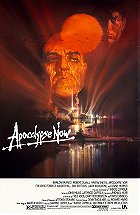 Posted : 17 years, 1 month ago on 9 May 2008 01:01
(A review of Apocalypse Now)
Posted : 17 years, 1 month ago on 9 May 2008 01:01
(A review of Apocalypse Now)
Apocalypse Now is a genuinely revolutionary war movie from legendary director Francis Ford Coppola. The film is a confronting, haunting war epic that is stimulating and monumental. Not only is it a fantastic war movie but it's also the most honest account of the futility of war.
Loosely based on Joseph Conrad's classic novella 'Heart of Darkness'; Apocalypse Now is a film that tells a story set in the Vietnam battlefields. The year is 1969 and the Americans are still battling the on-going Vietnam War. U.S. Special Forces Captain Willard (Sheen) is sent on a confidential mission that officially 'does not exist - nor will it ever exist' to terminate a renegade Green Beret named Walter Kurtz (Brando) who has established himself as a God amongst a local tribe. Captain Willard travels up the Nung River in a U.S. Navy Patrol Boat into Cambodia to carry out his mission. He is accompanied by a faction of soldiers who don't have a clue about the nature of the mission due to its high level of confidentiality. As Willard descends into the jungle, he is slowly taken by the jungle's mesmerising powers. As he battles the insanity around him, the journey slowly makes Willard more and more like the man he was sent to kill.
Apocalypse Now is a harrowing war film that will always be distinguished due to its power as well as its hypnotic, virtually unsurpassed brilliance. The unnerving, unforgettable images only heighten the film's reputation as one of the most graphic war films ever made. It will take days, perhaps weeks, to get over the haunting visual images that are a prominent element of this outstanding movie.
The production was plagued with troubles; including wild weather that destroyed the sets, and the elongated production period due to unforseen consequences. Regardless of this troubled production director Francis Ford Coppola delivers an extraordinary, controversial addition to the multitude of Vietnam War movies. And of course the film was shot beautifully on location; showcasing some utterly gorgeous landscape and some eye-catching dense jungles as well.
However the film is about 150 minutes in length, and unfortunately outstays its welcome and loses the attention of the viewer at about the two hour mark. Of course, it was still tremendously well made but I felt that some trimming would have been necessary. And that's only the theatrical version - there's also a 200-minute 'Redux' cut.
Although my attention was thrown a few times as I was watching the movie, Coppola's directing always ensured there was something fascinating going on during the film. This could be a battle, an absorbing dialogue scene or some haunting voice-over narration.
Martin Sheen makes a very credible American soldier. There is always something about him that keeps the audience enthralled during the scenes of heavy drama. Marlon Brando had already made a name for himself after such films as The Godfather and On the Waterfront. Surprisingly his role is very minor in this movie. Nonetheless his performance is superb. During his final monologue it felt like he was a man on the edge; someone who is very close to insanity. His credibility is never thrown. As Brando aged he only became better. The supporting cast is a mixed bunch of now-famous actors including Robert Duvall, Laurence Fishburne, Harrison Ford and Dennis Hopper. All of these actors made an appearance before they became really famous. With this film they are given the opportunity to display talent while still youthful.
Apocalypse Now is a stunning film that will always be not only one of the greatest war movies, but also one of the greatest movies in cinematic history. This Vietnam tale is one that does justice to its source material. Be warned that the film is quite painfully long.
 0 comments, Reply to this entry
0 comments, Reply to this entry
A beautiful movie.
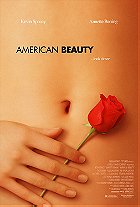 Posted : 17 years, 1 month ago on 9 May 2008 12:52
(A review of American Beauty)
Posted : 17 years, 1 month ago on 9 May 2008 12:52
(A review of American Beauty)
American Beauty is a virtuoso, provocative, multi-faceted, incisive and unconventional drama that takes a comprehensive glimpse at the American dream gone wrong. I had approached this movie with a great deal of hesitation. There were reviews aplenty from people who praised this film as a wonderful masterpiece of the highest order. Before watching this film I could never have believed that making a film of such stature and power would actually be possible.
American Beauty is a magnificent psychological drama that takes a satirical look at the American community. The characters are versatile and intricate. The movie demonstrates the darkest things of a person's personality. Even though the characters do some truly appalling things the audience can still be involved with the characters because although bad, they are still shown as unexaggerated and human.
Lester Burnham (Spacey) is a forty-something year old suburban father who is depressed and unhappy. He has a wife (Carolyn; played by Benning), who is looking for sexual pleasure elsewhere, and he has a daughter (Jane; played by Birch) who hates her father and falls in love with their new next door neighbour Ricky (Bentley). Lester's job is leading nowhere when his company decides they have to cut back on their staff due to money issues. Lester also becomes fascinated and infatuated with one of Jane's friends; Angela (Suvari). Lester's behaviour drives him further and further away from his family that already detest him. From there, we follow each family member who are on their own emotional journey of life.
American Beauty is an extremely powerful drama carried by some superb performances. The acting is truly amazing with Kevin Spacey in a performance that won him an Oscar. Spacey has the look and feel of your usual stereotypical suburban American father. He may seem conventional but these stereotypes are explored; revealing a personality with a lot more depth and complexity. There are several horrible character traits he exhibits; however it's impossible not to empathise with him. His family drifts away from him and we can genuinely feel his motivations.
The driving force behind the film is not only the performances but the screenplay. Each line of dialogue is intriguing and enthralling. There is never a wasted minute during the film's duration because of how meticulously the dialogue was written; intelligent, fascinating and profoundly insightful.
The direction, which also gained an Oscar, is utterly flawless. Sam Mendes compliments the great screenplay with equally accomplished directing. Each scene is both engaging and meaningful; it gives the audience further insight into the characters that are being examined so deeply. On top of this, it's compelling storytelling as well as being occasionally humorous.
American Beauty is a lot more complex and eloquent than it sounds; it's a brilliant and amazing story that constructs an indication of the sad reality of contemporary American society. I never expected a film like this to be as brilliant as it turned out to be. It's relevant to today's society, it carries a good message about life and it is extremely potent. Winner of 5 Oscars including Best Picture, Best Director, Best Actor, Best Cinematography and Best Writing.
 0 comments, Reply to this entry
0 comments, Reply to this entry
Typical Judd Apatow.
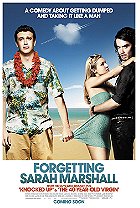 Posted : 17 years, 1 month ago on 9 May 2008 12:35
(A review of Forgetting Sarah Marshall )
Posted : 17 years, 1 month ago on 9 May 2008 12:35
(A review of Forgetting Sarah Marshall )
Judd Apatow's company have been popular and successful in recent years. Face it: now the man is going to be known as the God of contemporary adult sex comedies. Personally I think the first few films he made were of a higher standard than his more recent work (I was slightly disappointed with Knocked Up and Superbad). Thankfully by altering the typical formula, Forgetting Sarah Marshall is one of the funniest movies of 2008.
Peter Bretter (Segel) is an unsuccessful musician who does music for a TV show called Crime Scene. The main star of Crime Scene is his girlfriend Sarah Marshall (Bell) with whom he has been together with for over 5 years. But the relationship between Sarah and Peter slowly disintegrates, resulting in them splitting up. At first Peter is significantly disheartened about living life without Sarah as his partner. After an unsuccessful burst of womanising and one-night stands he comes to the realisation that he love life is now ruined because of his heart-breaking split with Sarah. Peter's brother Brian (Hader) suggests that Peter takes a vacation to take his mind off everything. Predictably, when Peter takes himself over to Hawaii for a vacation he is confronted by his worst nightmare: his former girlfriend Sarah staying in the same hotel with her new British rock-star boyfriend Aldous (Brand).
Because of the talent involved you can guarantee that Forgetting Sarah Marshall will deliver the laughs. I hadn't seen the trailer before watching the movie so a majority of the laughs were fresh for me. Maybe if you've seen the trailer too many times the whole film won't be as great.
The movie has a surprisingly high film value in addition to just an entertainment value. Instead of just focusing on the laughs the filmmakers also focused on drama. I have seen many comedies that try to hard to create hilarious situations for the actors. In this case there was focus on this and creating something more than just your average sex comedy.
Jason Segel not only starred in the lead role but he also wrote the screenplay. This is a bonus because the screenwriter can create the character on screen that he imagined while putting the film on paper. His performance encapsulates everything a guy feels after a serious relationship is terminated. This is far from Oscar material but at times his emotions were very palpable and naturalistic. Of course, maintaining the tone of the film there is a lot of overzealous crying as well. There are a number of Judd Apatow regulars that appear in the film's cast. Most notably is Jonah Hill who has been a favourite with Apatow in recent productions. And then of course recognition has to go to Kristen Bell for being a very realistic Sarah Marshall. Like all the cast members, this isn't Oscar material; just a bit of overacting and hilarious mannerisms to guarantee a bunch of laughs.
The director Nicholas Stoller is able to keep the laughs constant without an awkward abundance of them. Particular credit must go to director Stoller for staging many of the scenes in very creative ways. I'm sure it would have been difficult filming when the action moves out to the water at times.
I thought one of the film's only real downfalls is that the film is slightly formulaic and clichéd. That being said, the film manages to stay away from about 75% of the typical clichés found in this genre. Beware that there is plenty of profanity and lots of sex scenes. This includes graphic moaning, full frontal nudity (of a guy) and graphic discussions of a sexual nature. You know this is definitely a movie from producer Judd Apatow.
Forgetting Sarah Marshall is everything we've come to expect from a modern adult sex comedy. Within the film you'll find a large assortment of memorable quotes and raunchy gags. If you enjoy other Apatow films like The 40-Year-Old Virgin and Knocked Up you will have a blast watching this one.
 0 comments, Reply to this entry
0 comments, Reply to this entry
Succeeds as a brainless action ride
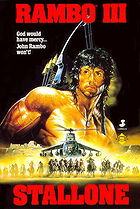 Posted : 17 years, 1 month ago on 8 May 2008 12:54
(A review of Rambo III)
Posted : 17 years, 1 month ago on 8 May 2008 12:54
(A review of Rambo III)With Sylvester Stallone featuring in multiple Rocky and Rambo sequels throughout the 1980s, there is little wonder why he got type-cast, or why interest in both franchises continued to decline. 1982's First Blood remains an excellent action-drama which is notable for emphasising the pain of Vietnam veterans in a compelling, stirring and exciting way. But the sequel, 1985's Rambo: First Blood Part II, degenerates into an over-the-top action show-reel which bears little resemblance to its predecessor. 1988's Rambo III continues the tradition of its immediate predecessor, taking us even farther from the iconic character as originally conceived. With any meaningful or substantial sense of poignancy vanishing from the series, the character of Rambo becomes a larger-than-life, prototypical American action hero here. There's absolutely nothing in this third Rambo adventure that has not been previously seen - it's full of violent action, minimalistic dialogue and more explosions than the mind can fathom. Nevertheless, Rambo III is a lot of fun for its target audience, and it succeeds as a brainless action ride.

A somewhat propagandist return of John Rambo (Stallone), this entry in the series once again puts the titular hero in the middle of a political topic of the period - in this case, it's the Soviet invasion of Afghanistan. Rambo III finds the troubled Vietnam veteran living a secluded life in a monastery. However, when Rambo learns that his former commanding officer, Colonel Trautman (Richard Crenna), has been captured by the Soviets, he takes it upon himself to wage a one-man war on the Russian forces to rescue his old friend. With assistance from some Afghan rebels, Rambo amasses enough ammunition to start World War 3, and heads into Soviet Territory. From this point onwards, the movie is nothing but action, with the badass protagonist taking the fight to the Russians the best way he knows how.
Upon release in 1988, Rambo III did not click with critics and movie-goers; it was heavily panned, and only grossed a third of its predecessor's box office earnings, which is particularly troubling since it was produced for a reported $63 million, the highest budget in film history at the time. Considering the disappointing box office, it's no wonder the Rambo series subsequently lay dormant for 20 years. For all of this, however, the film is not a total loss. Supported by a tremendous budget, director Peter MacDonald (who replaced Russell Mulcahy not long into filming) creates the most epic-feeling instalment in the franchise, with exotic locations as well as lots of guns, fiery explosions, big action sequences, and helicopters. In keeping with action films of the period, there are also cheesy one-liners and villainous villains, in addition to a vast body count. And, of course, the film is frequently badass. Although the dialogue is utterly risible from time to time, there are some notable interactions which are sure to provoke big dumb grins. It is all accompanied by a flavoursome, rousing musical score courtesy of franchise mainstay Jerry Goldsmith.

Aside from the frequently awesome action sequences, Rambo III does aim for a heartfelt message and tries to bring Rambo full circle. However, these ideas are half-hearted, buried underneath the relentless set-pieces - in short, the filmmakers are unable to emulate the heart or poignancy which characterised First Blood. Additionally, although Rambo III succeeds as a big dumb '80s action film, it can be criticised for its sheer ridiculousness. Rambo and his rebel amigos encounter a number of preposterous situations throughout the film and make it out alive, making this the silliest entry in the series. What happened to the grounded action of First Blood?! Rambo III is also painfully by-the-numbers, and the first half tends to drag - this is actually the longest entry in the series to date, despite being the most thematically slim. On the acting front, Stallone's performance (perhaps deservedly) earned him another Razzie Award for Worst Actor. In addition, the film was also nominated for Worst Picture, Worst Director, Worst Screenplay and Worst Supporting Actor (for Crenna).
All things considered, Rambo III is a perfectly adequate way to pass 100 minutes of your life. This is the weakest in the Rambo canon, but it's certainly entertaining, and fans will get what they yearn for in terms of explosions, stunts, high body counts and memorable kills. If you're not a die-hard action nut, though, there is absolutely nothing in this outing that will appeal to you. The film may be dedicated to the people of Afghanistan, yet the politics of the film are laughable - Rambo could have been fighting alongside any foreign army facing a Communist threat, and the film would have been virtually identical in execution. In spite of its flaws, Rambo III remains an enjoyable piece of work that makes up in thrills what it lacks in relevance.
6.2/10
 0 comments, Reply to this entry
0 comments, Reply to this entry
Average teen flick.
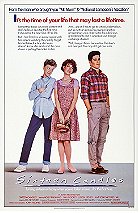 Posted : 17 years, 1 month ago on 8 May 2008 12:41
(A review of Sixteen Candles)
Posted : 17 years, 1 month ago on 8 May 2008 12:41
(A review of Sixteen Candles)
Sixteen Candles is one of John Hughes' earliest movies. During the 1980s Hughes was the guru when it came to classic high school comedies that accurately encapsulate the torment and pain of life as a teenager. This film was Hughes' directorial debut. His career immediately took off as he directed such famous iconic teenage classics as Ferris Bueller's Day Off and The Breakfast Club among several others.
Sixteen Candles is unfortunately one of Hughes' weakest films. It had all the suitable ingredients, but it was far too stereotypical and unfunny to be anything special. Over two decades after it was released and I still hear comments from people who have nostalgic memories of seeing the film. I'm sure when it was first released it was very popular. Time just hasn't been good to the film at all.
1980's teen favourite Molly Ringwald plays a teenager named Samantha Baker. Samantha's life hasn't been too good lately and wakes up on the morning of her 16th birthday full of promise and high hopes that it will be a special day. But Samantha's sister is getting married in the next few days and it has taken precedence over everything. Because everyone is so preoccupied with the upcoming wedding they all completely forget about Samantha's birthday. To make things even worse, Sam has a massive crush on the most popular guy in school (Schoeffling), and a young geek (Hall) develops an enormous crush on her.
I thought the concept of this movie was extremely good and I figured that it would be in good hands with Hughes at the helm. Despite such promise I found Sixteen Candles to be a teenage comedy without many laughs at all. Instead there's mindless potty humour, some clichéd jokes and a bunch of stereotypical characters. Most teen comedies from the 80s had a selection of stereotypical characters; however the characters presented here are shallow and played out for laughs. In a film like The Breakfast Club the characters are stereotypical, but also a lot deeper.
The script for this film just didn't have enough laughs. I will admit that there were a few decent lines of dialogue; however most of the jokes were crude and bleak (some even outrageously offensive). The filmmaking is fairly standard for the genre. Hughes knows how to direct a movie quite well. It was just the screenplay (that he penned himself) that ultimately doomed the movie.
Throughout the film's duration I blankly stared at the screen, expecting something interesting or funny to occur. No such luck, unfortunately. I don't know whether this can be attributed to my sense of humour or the screenwriter - either way the laughs are still very limited. I also noticed quite a bit of offensive material thrown in here as well (it basically encourages rape at some point). Ultimately, this script could have been a lot better if Hughes had removed the offensive stuff and instead replaced it with actual laughs.
Molly Ringwald's career was built on the 80s teen flicks she featured in. In this film I couldn't find many redeeming features in her character. Because her family forgot her birthday she feels that she has permission to be a bitch to everybody. I didn't find myself empathising with her very much. A very young Anthony Michael Hall plays an interesting young geek. He's quite irritating at times. Even so, he is still given a few good lines to work with.
Sixteen Candles falls strictly in the teen coming-of-age genre. Time hasn't been good to the film at all. The whole thing is clichéd and predictable, with a few too many unrealistic "feel good" moments. The only redeeming feature of this flick would be the limited but occasionally funny gags that are mainly toilet humour or sex-related dialogue. The impressive 80's soundtrack was another thing that I certainly liked. Some of the music is classic and catchy. If you were a teenager of the 80s you'd remember music like this.
Sixteen Candles is a film you can afford to miss. You're not missing anything spectacular. Honestly, it's not worth your time.
 0 comments, Reply to this entry
0 comments, Reply to this entry
 Login
Login
 Home
Home 183 Lists
183 Lists 1670 Reviews
1670 Reviews Collections
Collections